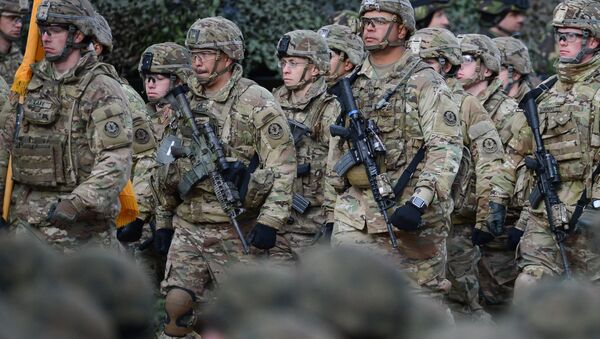The European Council said in a summary of conclusions made after the two-day summit in Brussels they welcomed progress in talks on the $15 billion European Defence Fund, in implementing a strategy for closer cooperation, and in improving military mobility.
"These initiatives contribute to enhancing the EU's strategic autonomy and its capacity to act as a security provider, while complementing and reinforcing the activities of NATO and strengthening EU-NATO cooperation," the final document reads.
The statement was made after French President Emmanuel Macron has been making a case for an EU army, with support from German Chancellor Angela Merkel. UK Defense Secretary Gavin Williamson has branded it an "absolutely crazy idea."
READ MORE: UK as Part of European Army 'Absolutely Crazy Idea' — British Defence Secretary
Commenting on the Macron's proposal, EU foreign policy and defense chief Federica Mogherini denied building one in November, just as NATO head Jens Stoltenberg warned that EU efforts should not compete with the alliance, which he called the bedrock for European security.
READ MORE: EU Lacks Manpower, Military Hardware to Create Joint Battle-Capable Army — Study
EU Leaders Call for ‘Swift Action’ Against Disinformation Ahead of 2019 Elections
Apart from the defence role of the bloc, the leaders of the 28 EU nations agreed Friday on the need for a prompt response to disinformation, which they recognized as part of hybrid warfare waged in the run-up to European polls.
In a six-page summary of conclusions adopted at the Friday summit, the European Council "calls for swift and decisive action at both European and national level on securing free and fair European and national elections."
This comes a week after the European Commission unveiled a joint action plan that more than doubled the spending on an EU-wide campaign in 2019 to counter disinformation ahead of next May’s European parliament vote.
The leaders decried the "spread of deliberate, large-scale, and systematic disinformation" as a strategic challenge for their democracies and called for a prompt implementation of the Commission’s roadmap to guarantee a coordinated and well-resourced response to this perceived existential threat.


